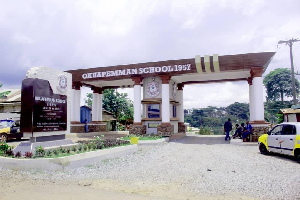- Home - News
- TWI News | TV
- Polls
- Year In Review
- News Archive
- Crime & Punishment
- Politics
- Regional
- Editorial
- Health
- Ghanaians Abroad
- Tabloid
- Africa
- Religion
- Election 2020
- Coronavirus
- News Videos | TV
- Photo Archives
- News Headlines
- Press Release
General News of Wednesday, 12 March 2003
Source: Ghanaian Chronicle
Do More to Address Poverty - IEA Fellow To Gov't
A senior fellow at the Institute of Economic Affairs (IEA), Prof. Bartholomew Armah, has emphasized the need for government to do more to address the Ghana Poverty Reduction Strategy (GPRS).
He said: "Although the sectoral allocations in the 2003 budget may broadly reflect GPRS priorities, spending the bulk of discretionary funds on salaries means that less will be available for the real job of poverty reduction."
Delivering a paper on the GPRS and the 2003 Budget at an IEA organized public forum in Accra on Monday, this week, Prof. Armah said, "The 2003 budget appears to follow the broad thrust of the 2002 budget particularly with respect to the discretionary expenditure to the broad sector."
These sectors of the budget include administration, economic services, infrastructure, social services, public safety and revenue agencies.
He explained that the road to the GPRS compliance remains plagued with structural and institutional rigidities that undermine attempts to achieve a sustainable balance between investment and wage expenditures.
Furthermore, he said, even with the visible improvements in the macro-economic sphere, the cost of credit in real terms remains high, as declines in the nominal interest rate have dragged painfully behind declines in the inflation rate.
"Consistent with government's stated priority of promoting agriculture, and improving education and the delivery of health services" he went on, "the 2003 budget has shifted resources towards these priority areas." Yet, he continued, "the relative share of allocations to the very high priority area of agriculture continues to decline.
" Prof. Armah pointed out that unlike last year when the decline was attributed to donors, the decline this year is due to relative declines in the Government of Ghana allocations to the Ministry of Agriculture.
Admittedly, he noted, agricultural modernization cuts across several sectors of the economy and hence, government's commitment to the sector cannot be measured solely on the basis of its allocations to the Ministry of Food and Agriculture.
However, he mentioned that the woeful lack of agricultural-related infrastructure, particularly irrigation and storage facilities, calls for increasing and not decreasing financial outlays to the ministry which incidentally plays a critical role in the provision of irrigation facilities.
The GPRS medium term priorities are categorized under five main thematic areas, namely macro-economic stability, production and gainful employment, human resource development and provision of basic services, special programs for the vulnerable and excluded and governance.
On whether the 2003 budget discretionary reflects the medium term priorities, Prof. Armah said the sectoral allocations to social services and administration reflect the broad priorities of the GPRS. "But the allocations to infrastructure, economic services and the agriculture sub-sector have declined since 2001," he noted.
Asked whether only government allocations are reflected in the GPRS priorities, Prof. Armah said even though total expenditure allocations are broadly consistent with the GPRS, it is important to isolate government expenditure allocation from donor allocations to determine whether one is not simply substituting for the other.
Touching on the budget and human resource development, Prof. Armah pointed out two key policy objectives in the budget, which include the provision of a model senior secondary school and model health centre in every district.
According to him, beyond statement of intent, there is no indication in the 2003 budget that funds are available for these initiatives.
For instance, he said, on the provision of model senior secondary schools, the budget merely states that 30 such schools have been identified as candidates for upgrading. "But it is not clear whether the rehabilitation and construction projects costing ?9.18 billion in the rural secondary schools is part of the model SSS initiative in the Medium Term Priorities."










